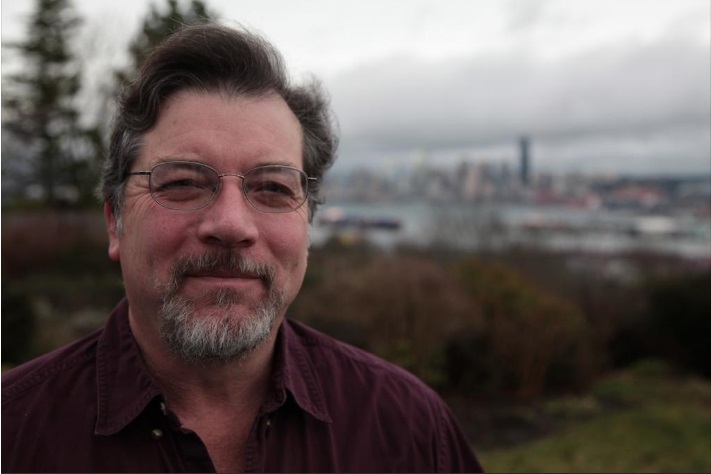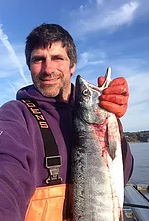This commentary originally appeared in the Puget Sound Business Journal
By Jeff Stonehill
 Over decades running Alaska fishing and Seattle construction businesses, my crew and I burned a lot of fuel. Ironically, our livelihood came from fish stocks and forests that now are choking on the fumes from burning fuel. The costs of carbon emissions were hidden in the past, but they’re coming home to roost.
Over decades running Alaska fishing and Seattle construction businesses, my crew and I burned a lot of fuel. Ironically, our livelihood came from fish stocks and forests that now are choking on the fumes from burning fuel. The costs of carbon emissions were hidden in the past, but they’re coming home to roost.
Pollution has become a fast-expanding hole in our wallets. As taxpayers, we pay billions to fight wildfires, floods, droughts, and a roster of other troubles that are either caused or amplified by carbon emissions from all that fuel we burn.
We can mend this hole by passing Initiative 1631 on November 6. This initiative applies a proven recipe for cutting pollution, reducing fuel consumption, and goosing economic growth. It’s called “price-and-invest” emissions policy: Put a modest price on carbon pollution, then invest the money to help people boost fuel efficiency, clean energy, and resilience against the consequences of pollution.
Don’t want your tax dollars wasted? Me neither. Wildfires are burning our money today—aggravated by climate-amplified heat and drought, along with poor fuel-management practices. Over the last five years, fighting the new wave of “megafires” cost Washington $1 billion, according to the Department of Natural Resources.
Climate-intensified floods, hurricanes and rising seas aren’t free either. Our US tax dollars are bailing out a federal flood insurance system that was swimming in $30 billion of red ink by 2017.
That doesn’t even count the cost of degrading the natural resources that gave my family a good living. Cutting pollution will help control the growing damage to our fisheries, our forests, and our snow-fed water supplies. Seafood alone supports nearly 61,000 jobs in Washington. Wood products support 101,000 jobs. Nearly 200,000 depend on outdoor recreation.
Climate impacts and ocean acidification are undermining these jobs today. Puget Sound’s unraveling foodweb is forcing drastic measures to protect dwindling Chinook salmon and endangered resident orca whales that feed on them. Chinook salmon are dying within weeks after entering saltwater. Massive blooms of toxic algae are thriving in warm, carbon-acidified seawater, displacing healthy prey species that sustain our fish stocks. These toxic algae are undermining coastal tourism and fishing businesses by forcing health authorities to shut down razor clam and Dungeness crab harvests.
Tired of paying the tab for unnecessary pollution? Me too. Thankfully, we can prosper by cutting the emissions behind these problems. Other states are already doing it successfully.
Despite the fear-mongering claims in oil-funded TV ads, other states have demonstrated that cutting carbon pollution with policies like Initiative 1631 saves money and strengthens the economy.
On the East Coast, businesses and consumers saved $1 billion through efficiency and clean power funded by revenue from a carbon price over the last three years. Nine states from Maine to Maryland share a regional price-and-invest policy to reduce carbon emissions from power plants. Instead of buying ever more imported fossil fuels, they kept $1 billion in their wallets.
Those same states reduced regulated emissions by more than 50% over the last nine years. Their efficiency and clean energy projects generated tens of thousands of new jobs, and added billions of dollars to their economy. They did it by investing carbon revenues to build a cleaner economy.
A key ingredient here is common sense. If we raise revenues to solve a problem, that’s what we should use those revenues for. That’s what Initiative 1631 does.
Accountability matters. This measure proposes a carbon fee, not a tax. That legal distinction keeps stray hands out of the till: Fee revenue can only be used for the purposes it is raised for. No unrelated pet projects allowed.
Under 1631, investments of carbon revenue will be dedicated to reduce GHG emissions (70%), to build climate resilience in waters and lands at the front lines of climate impacts (25%), and to help communities cope with impacts of climate change like wildfire, flooding, and the need to educate kids so they can deal with the problem (5%). About one twentieth of the money for pollution reduction is reserved to help fossil fuel employees transition to other work as demand for fossil fuels drops.
This initiative is not a retread of the “carbon tax” measure that voters rejected in 2016. That year, some climate advocates promoted a wasteful and ineffective measure to tax carbon emissions and then give away the money in business tax breaks and “rebates” for low-income people. That might feel good, but it doesn’t do much to reduce pollution, and it doesn’t deliver the savings or the jobs we can get from this year’s stronger, smarter policy.
Come November 6, we have a chance to put our money to work where it delivers. Vote for Initiative 1631.
BIO: Jeff Stonehill ran a commercial salmon fishing business in Alaska for 20 years, and a construction business in Seattle for 15. He participates in the Working Group on Seafood and Energy, which supplied information for this article.
Note: Global Ocean Health and the Working Group on Seafood and Energy provided assistance with this piece

 In the mid-1980s, when I started seining with my dad for Fraser River sockeye, the Puget Sound fishery was already declining. But lately the consequences of a fraying marine food web are spreading far beyond the fishing fleet. Living in Friday Harbor, I have a front row seat.
In the mid-1980s, when I started seining with my dad for Fraser River sockeye, the Puget Sound fishery was already declining. But lately the consequences of a fraying marine food web are spreading far beyond the fishing fleet. Living in Friday Harbor, I have a front row seat.